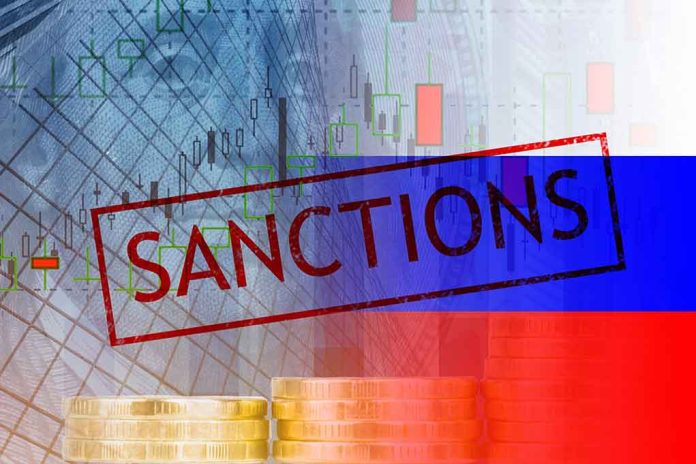
The United States has imposed sweeping sanctions on over 400 entities and individuals supporting Russia’s war efforts in Ukraine, targeting key sectors and increasing pressure on Moscow’s economy.
At a Glance
- U.S. Treasury issues new sanctions targeting Russia’s war economy and financial system
- Over 300 individuals and entities across various regions targeted for enabling Russia’s war effort
- Sanctions aim to disrupt financial and logistical support prolonging the conflict in Ukraine
- Measures include restrictions on Russian access to U.S. software and IT services
- China opposes U.S. sanctions on Chinese companies linked to Russia’s war efforts
U.S. Treasury Takes Decisive Action
The U.S. Department of the Treasury has taken a firm stance against Russia’s continued aggression in Ukraine by issuing new sanctions targeting the country’s war economy. These measures are part of a coordinated effort with G7 leaders to increase pressure on Moscow and disrupt its ability to sustain its military operations.
Treasury Secretary Janet L. Yellen emphasized the impact of these sanctions on Russia’s financial system:
“Russia’s war economy is deeply isolated from the international financial system, leaving the Kremlin’s military desperate for access to the outside world,” said Secretary of the Treasury Janet L. Yellen. “Today’s actions strike at their remaining avenues for international materials and equipment, including their reliance on critical supplies from third countries. We are increasing the risk for financial institutions dealing with Russia’s war economy and eliminating paths for evasion, and diminishing Russia’s ability to benefit from access to foreign technology, equipment, software, and IT services. Every day, Russia continues to mortgage its future to sustain its unjust war of choice against Ukraine.”
Targeted Sanctions and Their Impact
The new sanctions are meticulously targeted against entities and individuals across various sectors. Key areas affected include technology, defense, and trade. The Treasury has specifically targeted Russia’s financial system, transnational networks laundering gold, and procurement of sensitive items.
“Russia has turned its economy into a tool in service of the Kremlin’s military industrial complex,” Treasury Deputy Secretary Wally Adeyemo said in a statement announcing the sanctions. “Companies, financial institutions, and governments around the world need to ensure they are not supporting Russia’s military-industrial supply chains.”
The sanctions include prohibitions on supplying certain IT services to Russia’s military-industrial base and designations of key Russian financial institutions such as the Moscow Exchange, National Clearing Center, and National Settlement Depository.
International Cooperation and Challenges
While the U.S. and its allies are tightening the economic noose around Russia, challenges remain. China has increased its purchase of Russian oil after Western sanctions, enhancing its influence in Russia. The effectiveness of the sanctions is questioned as Russia continues to support its economy through international oil and gas sales.
China has voiced opposition to the latest U.S. sanctions on Chinese companies allegedly linked to Russia’s war efforts. The Chinese government plans to take measures to protect its businesses’ rights and interests, highlighting the complex geopolitical landscape surrounding these sanctions.
Looking Ahead
As the conflict in Ukraine continues, the U.S. and its allies remain committed to using economic pressure as a tool to promote geopolitical stability. The Treasury’s actions, coupled with efforts from the State Department and other agencies, underscore the comprehensive strategy to diplomatically and economically isolate Russia. The effectiveness of these measures will likely be closely watched in the coming months as the international community seeks a resolution to the ongoing conflict.





